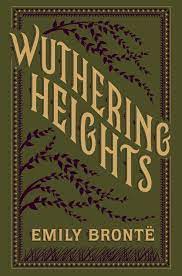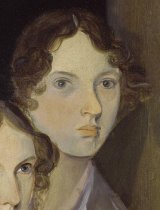Wuthering Heights Page #24
Wuthering Heights is an 1847 novel by Emily Brontë, initially published under the pseudonym Ellis Bell. It concerns two families of the landed gentry living on the West Yorkshire moors, the Earnshaws and the Lintons, and their turbulent relationships with Earnshaw's adopted son, Heathcliff.
Coming down somewhat later than usual, I saw, by the sunbeams piercing the chinks of the shutters, Miss Catherine still seated near the fireplace. The house-door was ajar, too; light entered from its unclosed windows; Hindley had come out, and stood on the kitchen hearth, haggard and drowsy. “What ails you, Cathy?” he was saying when I entered: “you look as dismal as a drowned whelp. Why are you so damp and pale, child?” “I’ve been wet,” she answered reluctantly, “and I’m cold, that’s all.” “Oh, she is naughty!” I cried, perceiving the master to be tolerably sober. “She got steeped in the shower of yesterday evening, and there she has sat the night through, and I couldn’t prevail on her to stir.” Mr. Earnshaw stared at us in surprise. “The night through,” he repeated. “What kept her up? not fear of the thunder, surely? That was over hours since.” Neither of us wished to mention Heathcliff’s absence, as long as we could conceal it; so I replied, I didn’t know how she took it into her head to sit up; and she said nothing. The morning was fresh and cool; I threw back the lattice, and presently the room filled with sweet scents from the garden; but Catherine called peevishly to me, “Ellen, shut the window. I’m starving!” And her teeth chattered as she shrank closer to the almost extinguished embers. “She’s ill,” said Hindley, taking her wrist; “I suppose that’s the reason she would not go to bed. Damn it! I don’t want to be troubled with more sickness here. What took you into the rain?” “Running after t’ lads, as usuald!” croaked Joseph, catching an opportunity from our hesitation to thrust in his evil tongue. “If I war yah, maister, I’d just slam t’ boards i’ their faces all on ’em, gentle and simple! Never a day ut yah’re off, but yon cat o’ Linton comes sneaking hither; and Miss Nelly, shoo’s a fine lass! shoo sits watching for ye i’ t’ kitchen; and as yah’re in at one door, he’s out at t’other; and, then, wer grand lady goes a-courting of her side! It’s bonny behaviour, lurking amang t’ fields, after twelve o’ t’ night, wi’ that fahl, flaysome divil of a gipsy, Heathcliff! They think I’m blind; but I’m noan: nowt ut t’ soart!—I seed young Linton boath coming and going, and I seed yah” (directing his discourse to me), “yah gooid fur nowt, slattenly witch! nip up and bolt into th’ house, t’ minute yah heard t’ maister’s horse-fit clatter up t’ road.” “Silence, eavesdropper!” cried Catherine; “none of your insolence before me! Edgar Linton came yesterday by chance, Hindley; and it was I who told him to be off: because I knew you would not like to have met him as you were.” “You lie, Cathy, no doubt,” answered her brother, “and you are a confounded simpleton! But never mind Linton at present: tell me, were you not with Heathcliff last night? Speak the truth, now. You need not be afraid of harming him: though I hate him as much as ever, he did me a good turn a short time since that will make my conscience tender of breaking his neck. To prevent it, I shall send him about his business this very morning; and after he’s gone, I’d advise you all to look sharp: I shall only have the more humour for you.” “I never saw Heathcliff last night,” answered Catherine, beginning to sob bitterly: “and if you do turn him out of doors, I’ll go with him. But, perhaps, you’ll never have an opportunity: perhaps, he’s gone.” Here she burst into uncontrollable grief, and the remainder of her words were inarticulate. Hindley lavished on her a torrent of scornful abuse, and bade her get to her room immediately, or she shouldn’t cry for nothing! I obliged her to obey; and I shall never forget what a scene she acted when we reached her chamber: it terrified me. I thought she was going mad, and I begged Joseph to run for the doctor. It proved the commencement of delirium: Mr. Kenneth, as soon as he saw her, pronounced her dangerously ill; she had a fever. He bled her, and he told me to let her live on whey and water-gruel, and take care she did not throw herself downstairs or out of the window; and then he left: for he had enough to do in the parish, where two or three miles was the ordinary distance between cottage and cottage. Though I cannot say I made a gentle nurse, and Joseph and the master were no better, and though our patient was as wearisome and headstrong as a patient could be, she weathered it through. Old Mrs. Linton paid us several visits, to be sure, and set things to rights, and scolded and ordered us all; and when Catherine was convalescent, she insisted on conveying her to Thrushcross Grange: for which deliverance we were very grateful. But the poor dame had reason to repent of her kindness: she and her husband both took the fever, and died within a few days of each other. Our young lady returned to us saucier and more passionate, and haughtier than ever. Heathcliff had never been heard of since the evening of the thunder-storm; and, one day, I had the misfortune, when she had provoked me exceedingly, to lay the blame of his disappearance on her: where indeed it belonged, as she well knew. From that period, for several months, she ceased to hold any communication with me, save in the relation of a mere servant. Joseph fell under a ban also: he would speak his mind, and lecture her all the same as if she were a little girl; and she esteemed herself a woman, and our mistress, and thought that her recent illness gave her a claim to be treated with consideration. Then the doctor had said that she would not bear crossing much; she ought to have her own way; and it was nothing less than murder in her eyes for any one to presume to stand up and contradict her. From Mr. Earnshaw and his companions she kept aloof; and tutored by Kenneth, and serious threats of a fit that often attended her rages, her brother allowed her whatever she pleased to demand, and generally avoided aggravating her fiery temper. He was rather too indulgent in humouring her caprices; not from affection, but from pride: he wished earnestly to see her bring honour to the family by an alliance with the Lintons, and as long as she let him alone she might trample on us like slaves, for aught he cared! Edgar Linton, as multitudes have been before and will be after him, was infatuated: and believed himself the happiest man alive on the day he led her to Gimmerton Chapel, three years subsequent to his father’s death. Much against my inclination, I was persuaded to leave Wuthering Heights and accompany her here. Little Hareton was nearly five years old, and I had just begun to teach him his letters. We made a sad parting; but Catherine’s tears were more powerful than ours. When I refused to go, and when she found her entreaties did not move me, she went lamenting to her husband and brother. The former offered me munificent wages; the latter ordered me to pack up: he wanted no women in the house, he said, now that there was no mistress; and as to Hareton, the curate should take him in hand, by-and-by. And so I had but one choice left: to do as I was ordered. I told the master he got rid of all decent people only to run to ruin a little faster; I kissed Hareton, said good-by; and since then he has been a stranger: and it’s very queer to think it, but I’ve no doubt he has completely forgotten all about Ellen Dean, and that he was ever more than all the world to her and she to him!
Translation
Translate and read this book in other languages:
Select another language:
- - Select -
- 简体中文 (Chinese - Simplified)
- 繁體中文 (Chinese - Traditional)
- Español (Spanish)
- Esperanto (Esperanto)
- 日本語 (Japanese)
- Português (Portuguese)
- Deutsch (German)
- العربية (Arabic)
- Français (French)
- Русский (Russian)
- ಕನ್ನಡ (Kannada)
- 한국어 (Korean)
- עברית (Hebrew)
- Gaeilge (Irish)
- Українська (Ukrainian)
- اردو (Urdu)
- Magyar (Hungarian)
- मानक हिन्दी (Hindi)
- Indonesia (Indonesian)
- Italiano (Italian)
- தமிழ் (Tamil)
- Türkçe (Turkish)
- తెలుగు (Telugu)
- ภาษาไทย (Thai)
- Tiếng Việt (Vietnamese)
- Čeština (Czech)
- Polski (Polish)
- Bahasa Indonesia (Indonesian)
- Românește (Romanian)
- Nederlands (Dutch)
- Ελληνικά (Greek)
- Latinum (Latin)
- Svenska (Swedish)
- Dansk (Danish)
- Suomi (Finnish)
- فارسی (Persian)
- ייִדיש (Yiddish)
- հայերեն (Armenian)
- Norsk (Norwegian)
- English (English)
Citation
Use the citation below to add this book to your bibliography:
Style:MLAChicagoAPA
"Wuthering Heights Books." Literature.com. STANDS4 LLC, 2024. Web. 29 Nov. 2024. <https://www.literature.com/book/wuthering_heights_1627>.




Discuss this Wuthering Heights book with the community:
Report Comment
We're doing our best to make sure our content is useful, accurate and safe.
If by any chance you spot an inappropriate comment while navigating through our website please use this form to let us know, and we'll take care of it shortly.
Attachment
You need to be logged in to favorite.
Log In